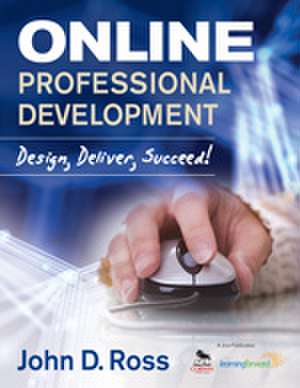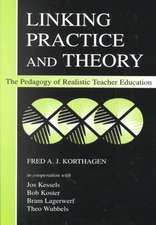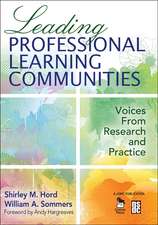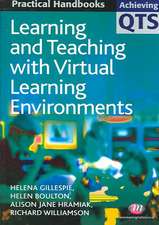Online Professional Development: Design, Deliver, Succeed!
Autor John D. Rossen Limba Engleză Paperback – aug 2011
Preț: 328.19 lei
Nou
Puncte Express: 492
Preț estimativ în valută:
62.80€ • 65.57$ • 51.97£
62.80€ • 65.57$ • 51.97£
Carte tipărită la comandă
Livrare economică 04-18 aprilie
Preluare comenzi: 021 569.72.76
Specificații
ISBN-13: 9781412987127
ISBN-10: 1412987121
Pagini: 208
Dimensiuni: 216 x 279 x 13 mm
Greutate: 0.58 kg
Ediția:1
Editura: SAGE Publications
Colecția Corwin
Locul publicării:Thousand Oaks, United States
ISBN-10: 1412987121
Pagini: 208
Dimensiuni: 216 x 279 x 13 mm
Greutate: 0.58 kg
Ediția:1
Editura: SAGE Publications
Colecția Corwin
Locul publicării:Thousand Oaks, United States
Recenzii
"The practical applications offered in this book provide valuable resources for developing online professional development that is firmly grounded in best practices of e-learning. Ross provides solutions on how to transform your training program into digitally rich experiences that will engage, enrich, and enhance learning."
"A really helpful tool to keep up with the exploding online environment for professional development."
"Too often, new technologies take center stage without a real focus on what our learning outcomes will be or how the technology will be implemented. What I appreciated about this book is that it very methodically laid out a plan that could be easily utilized by school districts interested in online professional learning. The templates and the questions are easily transferable to any team or process."
"In this well-written, easy-to-digest resource, John Ross draws on his years of experience to help educators consider why an online approach might be the answer to their professional development needs. He carefully outlines the technical questions and processes needed to support a successful effort."
"John Ross provides real-life examples and resources that will ensure online professional learning produces changes in educator practice and student learning."
"John Ross provides a timely and unique look at online learning in this ground-breaking book. His thorough, practical, and state-of-the-art approach to online learning is critical to the future of online professional development."
"This book explores why online professional development is a good option, how to get started, which technologies to use and how to put it all together. Experiences of other educators in the book allow the reader to benefit and create a cost-effective path to success."
"A really helpful tool to keep up with the exploding online environment for professional development."
"Too often, new technologies take center stage without a real focus on what our learning outcomes will be or how the technology will be implemented. What I appreciated about this book is that it very methodically laid out a plan that could be easily utilized by school districts interested in online professional learning. The templates and the questions are easily transferable to any team or process."
"In this well-written, easy-to-digest resource, John Ross draws on his years of experience to help educators consider why an online approach might be the answer to their professional development needs. He carefully outlines the technical questions and processes needed to support a successful effort."
"John Ross provides real-life examples and resources that will ensure online professional learning produces changes in educator practice and student learning."
"John Ross provides a timely and unique look at online learning in this ground-breaking book. His thorough, practical, and state-of-the-art approach to online learning is critical to the future of online professional development."
"This book explores why online professional development is a good option, how to get started, which technologies to use and how to put it all together. Experiences of other educators in the book allow the reader to benefit and create a cost-effective path to success."
Cuprins
Preface
Acknowledgments
About the Author
1. Why Online Professional Development?
The OPD Framework
Asking the Right Questions
Why Online Professional Development
Caveat Emptor: Talking to Vendors
Determining Your Need for Online Professional Development
Take Action: Conduct a Needs Assessment and Create Your Vision
Conclusion
2. How Much Does It Cost?
Outcomes
Take Action: Determine Your Desired Outcomes
Measuring Your Outcomes
Support
Security
Required Technology
Ease of Use
Risk
Caveat Emptor: Supporting Your Outcomes
Economies of Scale
Conclusion
Take Action: Set Your Mission
3. How Do I Get Started?
Take Inventory
Caveat Emptor: Facilitation Models
Caveat Emptor: Partnering for Success
Conclusion
Take Action: Gap Analysis to Describe Your Needs
4. What Does Good Online Learning Look Like?
Why Instructional Design?
Take Action: Instructional Design Considerations
Getting Your Hands Dirty
Take Action: Content Development Timeline
Using Media to Help (Or Hinder) Learning
Conclusion
Caveat Emptor: Evaluating Media in Online Content
5. What Technologies Are Right for Me?
A Word About Learning Objects
Presenting basic information via text and images
Demonstrating a process, sequence, or procedure
Hosting asynchronous interactions
Hosting synchronous interactions
Growing a learning community
Monitor learning
Take Action: Exploring Technology Specifications
Infrastructure for online professional development
Caveat Emptor: Is Free Right for Me?
Conclusion
Caveat Emptor: Evaluating a Management System
6. Putting it All Together
Gathering all the pieces
Taking Care of Business
Take Action: What Online Facilitators Should Know and Be Able to Do
Putting the Pieces Together
Take Action: Putting all the Pieces Together
Celebration
7: Did it work?
Formative evaluation
Is it better than face-to-face?
Measuring your outcomes
Take Action: Measuring Your Desired Outcomes
Was it worth it?
One story: The framework in action
Design, Deliver, Succeed!
References and Resources
References
Index
Acknowledgments
About the Author
1. Why Online Professional Development?
The OPD Framework
Asking the Right Questions
Why Online Professional Development
Caveat Emptor: Talking to Vendors
Determining Your Need for Online Professional Development
Take Action: Conduct a Needs Assessment and Create Your Vision
Conclusion
2. How Much Does It Cost?
Outcomes
Take Action: Determine Your Desired Outcomes
Measuring Your Outcomes
Support
Security
Required Technology
Ease of Use
Risk
Caveat Emptor: Supporting Your Outcomes
Economies of Scale
Conclusion
Take Action: Set Your Mission
3. How Do I Get Started?
Take Inventory
Caveat Emptor: Facilitation Models
Caveat Emptor: Partnering for Success
Conclusion
Take Action: Gap Analysis to Describe Your Needs
4. What Does Good Online Learning Look Like?
Why Instructional Design?
Take Action: Instructional Design Considerations
Getting Your Hands Dirty
Take Action: Content Development Timeline
Using Media to Help (Or Hinder) Learning
Conclusion
Caveat Emptor: Evaluating Media in Online Content
5. What Technologies Are Right for Me?
A Word About Learning Objects
Presenting basic information via text and images
Demonstrating a process, sequence, or procedure
Hosting asynchronous interactions
Hosting synchronous interactions
Growing a learning community
Monitor learning
Take Action: Exploring Technology Specifications
Infrastructure for online professional development
Caveat Emptor: Is Free Right for Me?
Conclusion
Caveat Emptor: Evaluating a Management System
6. Putting it All Together
Gathering all the pieces
Taking Care of Business
Take Action: What Online Facilitators Should Know and Be Able to Do
Putting the Pieces Together
Take Action: Putting all the Pieces Together
Celebration
7: Did it work?
Formative evaluation
Is it better than face-to-face?
Measuring your outcomes
Take Action: Measuring Your Desired Outcomes
Was it worth it?
One story: The framework in action
Design, Deliver, Succeed!
References and Resources
References
Index
Notă biografică
John Ross has been helping educators from the classroom to the state board room better understand how technology integration enhances school improvement efforts for more than a decade. Spearheading the 2004 launch of an online professional development environment for an educational non-profit, Dr. Ross has since designed and delivered online professional development that has gone to many thousands of educators in Alabama, Florida, Georgia, North Carolina, Tennessee, and Virginia. He has connected with educators across the nation through podcasts, webcasts, webconferences, social networks, dabbling in Second Life, and his blog.
Dr. Ross is the subject-matter expert for Principal Connections Online, an expanded, Web-based version of the popular training on technology integration for K-12 leaders. He worked with the Council of Chief State School Officers (CCSSO) to design and develop the free, Web-based Data-Based Decision Making Tool: A Resource for Teachers (www.edvantia.org/dbdm), a comprehensive guide for developing and implementing school improvement efforts; and also developed the Web-based version of the K-12 Total Cost of Ownership, or TCO, Calculator (www.edvantia.org/tco), which is based on the work of the Integrated Technology in Education Group. He served as the director of the Institute for the Advancement of Emerging Technologies in Education and as the director of technology for the Appalachia Regional Comprehensive Center (ARCC), both funded by the U.S. Department of Education, where he has educators at all levels investigate and incorporate new and emerging technologies in support of their work.
Dr. Ross is a frequent presenter in the field of educational technology at state and national conferences and has served as a consultant and trainer for teachers, administrators, and policymakers. He teaches an online graduate class he created about technology integration for Bethel University based on the textbook he co-authored with Dr. Katherine Cennamo from Virginia Tech and Dr. Peg Ertmer from Purdue. The textbook, Technology Integration for Meaningful Classroom Use: A Standards-Based Approach, is the first to address the revised National Educational Technology Standards for Teachers (NETS-T) developed by the International Society for Technology in Education (ISTE). Dr. Ross was a classroom teacher for 10 years and holds a Ph.D. in curriculum and instruction and instructional technology from Virginia Tech.
Dr. Ross is the subject-matter expert for Principal Connections Online, an expanded, Web-based version of the popular training on technology integration for K-12 leaders. He worked with the Council of Chief State School Officers (CCSSO) to design and develop the free, Web-based Data-Based Decision Making Tool: A Resource for Teachers (www.edvantia.org/dbdm), a comprehensive guide for developing and implementing school improvement efforts; and also developed the Web-based version of the K-12 Total Cost of Ownership, or TCO, Calculator (www.edvantia.org/tco), which is based on the work of the Integrated Technology in Education Group. He served as the director of the Institute for the Advancement of Emerging Technologies in Education and as the director of technology for the Appalachia Regional Comprehensive Center (ARCC), both funded by the U.S. Department of Education, where he has educators at all levels investigate and incorporate new and emerging technologies in support of their work.
Dr. Ross is a frequent presenter in the field of educational technology at state and national conferences and has served as a consultant and trainer for teachers, administrators, and policymakers. He teaches an online graduate class he created about technology integration for Bethel University based on the textbook he co-authored with Dr. Katherine Cennamo from Virginia Tech and Dr. Peg Ertmer from Purdue. The textbook, Technology Integration for Meaningful Classroom Use: A Standards-Based Approach, is the first to address the revised National Educational Technology Standards for Teachers (NETS-T) developed by the International Society for Technology in Education (ISTE). Dr. Ross was a classroom teacher for 10 years and holds a Ph.D. in curriculum and instruction and instructional technology from Virginia Tech.
Descriere
Based on proven principles of professional learning and instructional design, John D. Ross's book provides a path to assessing your needs, the cost, design, and results.









